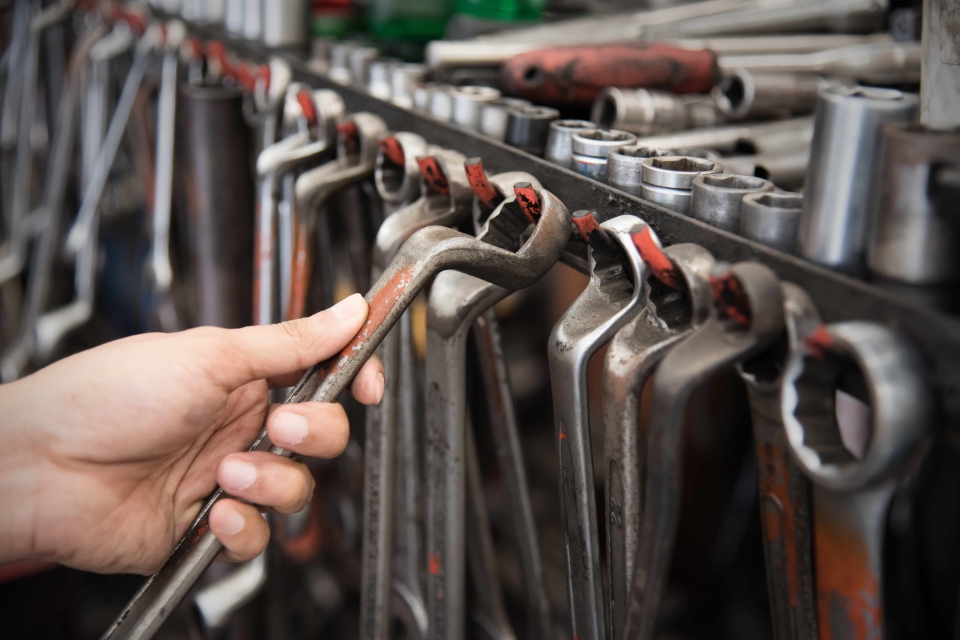Taiwan's SME notes trends shaping the hand tools industry for next decade
2022/02/16 | By CENS
The COVID-19 pandemic's disruption on the economy has propelled the lesser-known aspects of the global supply chain into mainstream awareness, such as the focus on Taiwan as semiconductor chip demands soared. While Taiwan is more widely known as the semiconductor hub of the world, equally crucial to keeping the world's economy running are hand tools. The island's hand tools sector is a centralized industry hub located in central Taiwan, where big-name companies, small-and-medium enterprises across upstream and downstream, and subcontractors co-exist together to fulfill the world's hand tools orders. A hand tool could go through a dozen manufacturing processes, all through different companies in the area, before returning to the original contractor.
For Stand Tool, a local hand tool designer and manufacturer based in Taichung, Taiwan, representative Brand Hsiao says companies like them are at the forefront of the supply chain disarray, where smaller companies face the brunt of dealing with challenges on multiple fronts. Unlike more prominent companies with the capital to sustain operations through difficult times, SMEs have less of a fallback plan and are more likely to go under during crisis times.
Order volume has increased, yet with rising prices from shipping, delayed orders, raw materials, and such, Hsiao said these circumstances have made it difficult to do business. In addition, backed-up ports worldwide, especially in the U.S., a significant hand tools market for Taiwanese exports, had delayed delivery times in an unprecedented fashion. At the same time, the influx of orders had prompted Hsiao to question the circumstances amid the surge, saying the increase of orders did not reflect the usual peak season. Along with other industry experts cited by local media, he believes the order surge could likely result in a business lull after the influx of demand and further disrupt the usual business operations and predictability in the industry.
Aging Populations and Talent Retention

In terms of demographic issues, Taiwan's traditional industries face universal challenges similar to their counterparts in Western countries. However, while Western countries heavily rely on imports, manufacturing hubs still exist in Taiwan, yet could eventually lack people to work. Traditional industries such as hand tools and hardware often have an older, aging workforce, so once they retire, businesses would be hard-pressed to find replacements or find and retain younger workers to pass on the know-how. As a result, companies either need to rely on migrant workers, which have become difficult to obtain due to stricter border restrictions during the pandemic or have brought automation to production chains and greater emphasis on talent retainment.
Hsiao says that Stand Tools, rather than contend with external factors out of their control, turned inwards by introducing training programs and improving employee skills and morale. As a result, in the two years of the pandemic, it was clear that companies capable of reinventing the wheel and maintaining the flexibility to keep up were more likely to survive. As Hsiao would quote, opportunity favors the prepared.
On the other hand, traditional industries like the hand tools industry have seen their talent pool and resources gradually diminished by concentration on specific, popular sectors, where new hires are more likely to flock to, Hsiao said. This is due to a more stringent collaboration channel between the academic and industry sectors in these popular industries, such as the semiconductor sector, where it ensures that higher education institutions are capable of producing industry-ready graduates, and should industry workers wish to change their career path, some would be able to return to these academic settings to teach and pass along industry know-how.
Very few industries in Taiwan can produce such a backdrop that can send new talents and retain industry experts between the academic and industry sectors, such as the semiconductor industry. However, this also highlights the difficulties and challenges for the other "less popular industries," such as the hand tools industry, as industry know-how and talent retention are less accessible and achievable.
To bridge the gap, in recent years, Taiwan Hand Tool Manufacturers Association (THTMA) had local companies, benchmark companies, China Steel Corporation, and the government pool resources together to innovate the manufacturing process and produce better quality products. With upstream companies such as China Steel providing quality raw materials and sub-contractors providing more specialized treatments, such as forging, heat treatment, and electroplating, Taiwanese hand tool companies quickly rolled out medium to high-end OEM products of big-name brands in the U.S. and Europe.

A government-led initiative also joined big-name machinery companies and hand tool companies to introduce more automation and smart machinery capabilities into the manufacturing process.
While more challenging to stay afloat during crisis times, Hsiao says most hand tool companies in Taiwan as SMEs serve as a confidence booster for potential international buyers. The industry has a more robust foundation as a hub-oriented sector, where the production chain is more compact and centralized in a single area. In contrast, hand tools industries in other countries could more likely face higher disruption risks due to longer-distanced processes in different locations or countries.
Taiwan's hand tool products are less competitive against Chinese products in terms of prices, but with the global economy entering the third year of the pandemic, Hsiao says the circumstances have shed an unflattering light on the pre-pandemic supply chain's just-in-time model. International policies, such as China's strict zero-COVID policies and power shortages in late 2021, have also caused further disruption of the supply chain. There is a need for greener energy and zero-carbon initiatives, which Hsiao says can become a deciding factor for companies deciding whether to do business in the country or not. All are factors and advantages that Taiwan's hand tool industry maintains. THMTA Chairman Huang Hsin-te was quoted by local media Global Views, that Taiwan's hand tools industry value could hit NTD$140 billion in 2021 as of writing. The current trajectory would ensure continued growth for at least another decade.

